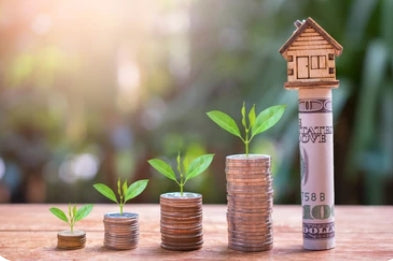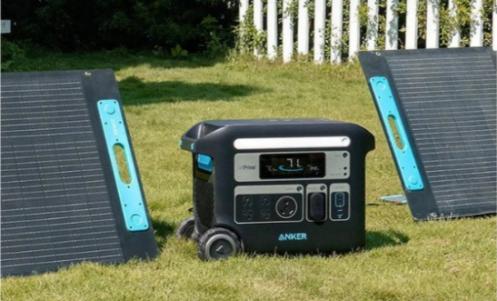
Do Solar Panels Increase Home Value? Here's the Whole Truth
Solar panels are an attractive energy option. Not only do they offer environmental benefits, but they can also lower energy costs through net metering and other incentives. However, do solar panels add value to a home? And if yes, how much value do solar panels add to your home? If you have such concerns as a homeowner, this blog is exactly for you. Get ready to learn more about how going green can be both beneficial for your wallet and the environment!

How Do Solar Panel Increase Home Value?
Do solar panels add value to a house? Yes. Indeed, solar panels can increase the value of a home by making it more attractive to potential buyers. But, how solar panels increase property value? Here are some ways in which solar panels can increase your home's value:
Energy savings: Solar panels generate electricity from the sun, which can reduce or even eliminate the need for electricity from the grid. This can lead to significant energy savings over time.
Reduced carbon footprint: This can be a selling point for home buyers who are environmentally conscious and willing to pay a premium for a home with sustainable features.
Market demand: As solar energy becomes more popular and affordable, home buyers are increasingly looking for homes with solar panel systems already installed. This can increase the market demand for homes with solar panels and drive up their value.
How Much Do Solar Panels Add to Home Value?
According to a study by the Lawrence Berkeley National Laboratory, homes with solar panels can fetch an average premium of around $4 per watt of solar power installed. For a typical 6-kilowatt solar panel system, this could add up to an increase in home value of around $24,000.
Another study by Zillow found that homes listed with solar panels sold on average for 4.1% more than comparable homes without solar panels. This equates to an additional $9,274 on the sale price of a typical home in the United States.
In addition to adding value to your home, solar panels can also help your home to sell faster. Zillow found that homes with solar panels sold on average 16 days faster than comparable homes without solar panels.
It's important to note that not all homes are equally suited for solar panels. In order to maximize the value added by solar panels, it's important to consider factors such as roof orientation, shading, and the age and condition of your roof.
What Factors Affect the Value of a Solar Home?
The value of a solar home is dependent on various factors, which can drastically impact its overall worth. If you are planning to invest in a solar home or sell one, it's critical to know these factors and how they affect the value of the property.
Local Electricity Rates
The cost of electricity in the local area can impact the value of a solar home. If the local electricity rates are high, a solar home with lower energy bills may be more valuable to potential buyers.
Local Solar Market
If there is a lot of competition in this area - with many installers offering varying levels of service - then the prices will remain competitive and installation costs relatively low. This will result in higher returns on investment for homeowners.
Solar Panel Ownership
Whether the solar panels are owned outright or leased can also impact the value of a solar home. Buyers may be more interested in homes with owned solar panels, as they provide greater long-term savings and ownership rights.
Solar System Condition
The age, efficiency, and overall condition of the solar panel system can also impact the value of a solar home. A newer, more efficient system with a longer lifespan can be more valuable than an older, less efficient system that may require costly repairs or replacement.

How Do Solar Panels Influence Property Tax?
Some states offer property tax exemptions for solar panel systems. Under these programs, the value of the solar panel system is excluded from the calculation of the home's assessed value for property tax purposes. Other states offer property tax assessments based on the "before" value of the property, which means that the installation of solar panels would not increase the property tax assessment.
In some cases, a solar panel system may increase the assessed value of your property, which could result in a small increase in property taxes. However, the energy savings from solar panels can offset this cost over time, resulting in net savings on energy costs.
How to Maximize Your Solar Panel Investment?
Do solar panels add value to your home? Yes! And when it comes to investing in solar panels, there are ways to reduce installation costs and increase the efficiency of the system for maximum returns. Here are the ways to maximize your solar panel investment.
Solar Incentives, Credits, and Rebates
There are incentives, credits, and rebates available for solar panel systems that can reduce the installation cost and increase the return on investment. For example, the federal solar tax credit offers a tax credit of up to 30% of the cost of the system, while local rebates and incentives can provide additional savings.
Net-Metering
Net metering is a billing arrangement that allows you to earn credits for any excess energy your solar panels generate that is fed back into the grid. These credits can be used to offset the cost of the energy you consume from the grid when your solar panels are not generating enough power. This can help you maximize the value of your solar panel system by reducing your energy bills even further.
Battery Backup
Battery backup can help you store excess energy generated by your solar panels for use later when the sun isn't shining. This can help you maximize your investment by allowing you to rely less on the grid and take advantage of the full potential of your solar panel system.
As for solar battery backup, the most useful and popular model is the Anker SOLIX F2000. This powerhouse, combined with the Anker 531 solar panel, can help maximize your return on investment in solar panels by providing reliable backup power during emergencies or outages. With a whopping 2048Wh capacity and 2400W output, the Anker SOLIX F2000 is competent to handle most of your solar needs with unmatched smoothness and efficiency. It also boasts a fast-charging system, utilizing GaNPrime™ technology, which allows for quick and efficient charging.

Maintenance and Servicing
Proper maintenance and servicing of your solar panels will ensure they continue to perform at their best. Regular cleaning, inspection and maintenance of your system will help to extend the lifespan of your panels, and ensure that they produce energy efficiently.
Final Thoughts
After reading the article, you must have found the answers to “do solar panels increase a home’s value”. As you can see, adding solar panels to your home can offer a number of immediate and long-term benefits. While there are considerations such as property tax and installation costs, installing solar can be a great investment that adds value both to your pockets and the environment. Be sure to research local regulations on solar panel installation before taking the plunge in order to maximize your benefits. Ultimately, it’s never been a better time to make an impact through environmentally sustainable choices, and going green with solar is one of the best decisions you can make for yourself and future generations. With increased home values, financial savings, and eco-friendly energy sources at your fingertips, there has never been a more appealing time to go solar!
FAQ
Is it hard to sell a house with solar panels?
It’s not as difficult to sell a house with solar panels as many people believe. You don’t need to worry about “Do solar panels hurt the resale value of your home?”. You simply need to be aware of the possible difficulties and grasp the ins and outs of what purchasers want. In many circumstances, installing solar panels on your property actually raises its value and improves its marketability.
How much do solar panels cost?
The of solar panels can vary depending on a variety of factors, including the size of the system, the quality of the equipment, the installation costs, and any applicable incentives or rebates. Here are some rough estimates for the cost of solar panel systems:
A small 2 kW system may cost around $4,000 - $7,000;
A medium-sized 5 kW system may cost around $10,000 - $15,000;
A large 10 kW system may cost around $20,000 - $30,000.
How long will it take for solar panels to pay for themselves?
The payback period for solar panels in the US is typically 8 years. However, it can vary greatly from house to homeowner. In general, the payback period typically lasts between 5-15 years but could be shorter if you qualify for any additional rebates or incentives offered by your state or local government.















